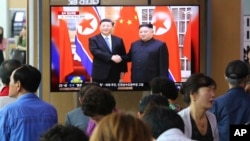Joyce Huang contributed to this report.
BEIJING — Chinese President Xi Jinping’s two-day state visit to North Korea couldn’t have come at a better time for both countries, analysts say. For Pyongyang, it could help pave the way back to negotiations with the United States. For Beijing, they say, it provides Xi Jinping with a way to highlight China's influence on the North Korean nuclear issue.
One key message of Xi's visit is the claimed strength of ties between the two countries – a narrative state media in both countries have been pushing heavily over the past two days. The Korean Central News Agency (KCNA) called the visit a “decisive” display of friendship.
KCNA said that friendship needs to be strengthened given the “serious and complex” state of international relations. According to China’s state-run Xinhua news agency, Xi said at a welcome banquet that the two countries had agreed to “unswervingly pass down their traditional friendship from generation to generation.”
But ties between the two countries are much more tense and complex than state media reports suggest, partly explaining why Xi is the first Chinese leader to visit North Korea since 2005.
North Korea’s flaunting of United Nations sanctions in the past -- including missile and nuclear tests -- has been a challenge to the relationship. Beijing has also joined the international community in imposing tough sanctions which remain in place against Pyongyang.
There has been some improvement in the relationship since the United States opened direct negotiations with the North, including President Donald Trump's high-profile summits with North Korean leader Kim Jong Un in Singapore and Hanoi. During almost the same period, Kim visited China four times.
The failure of the latest summit in Hanoi has given China an opportunity to play a larger role in the nuclear issue. But it’s not about friendship, says Zhao Tong, a researcher with the Carnegie Tsinghua Center for Global Policy.
“I don’t believe there is any real trust or any personal chemistry,” Zhao says. China and North Korea "want to improve relations because of calculations of national interests.”
From North Korea’s point of view, it is about resuming diplomacy and easing up the pressure from sanctions, Zhao says, noting that Kim Jong Un is anxious. Earlier this month, Kim sent a message to the U.S president, one that Trump called a “beautiful letter.”
“There is a growing need on the DPRK (Democratic People’s Republic of Korea) side to get diplomacy going again and hopefully get sanctions relaxed as soon as possible,” Zhao says.
Joseph Siracusa, a professor of human security and international diplomacy at the Royal Melbourne Institute of Technology, says Kim is stuck between a rock and a hard place.
“If he gives the president of the United states too much, the North Korean military will shoot him in the night,” Siracusa says. “If he gives the president too little, he’s going to have a shooting war with America 12 months down the road.”
Siracusa says Xi's decision to visit North Korea is both deliberate and purposeful, especially given that China’s leader will sit down to discuss trade frictions with Trump next week on the sidelines of a summit for leaders of the Group of 20 nations in Japan.
By traveling to North Korea and trying to advance the nuclear issue, Xi may be trying to offer himself as “maybe an honest broker.”
“I think Xi is going to play North Korea to the extent where he can get something out of the Americans, either on trade or maybe a free hand in the South China Sea. There is a grand bargain waiting here,” Siracusa says.
Zhao Tong says China is trying to show it can help at a time when relations between Washington and Beijing are facing big challenges.
“At this moment, it will also help President Xi’s subsequent meeting with President Trump,” Zhao says. “President Xi is also worried about the direction of the U.S.-China bilateral relationship.”
He adds that if talks between Pyongyang and Washington resume after Trump visits South Korea later this month, this week's strategic discussions between North Korea and China will be seen to have been helpful.




